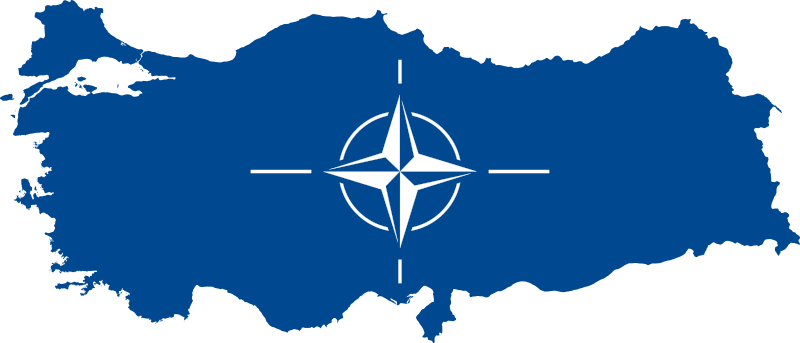NATO and Turkey: An Imminent Divorce?
September 3, 2019 | Expert Insights

Background
Makers of Turkish policy continue to shoulder the burden of their Ottoman past. They remain apprehensive about the creation of a Kurdish state fearing another Treaty of Sevres of 1920, after World War I, which portioned the Ottoman Empire giving Western Anatolia to Greece, placing Bosporus and Dardanelles’ under the League of Nations. Worse, it proposed to create the territories of Armenia and Kurdistan under the Great Powers. Thankfully for Turkey, the treaty was never implemented but Turkish phobia remains till date.
The policy of conciliation with Moscow, begun during the last stages of the First World War, was cemented during Turkey’s national struggle and Russia’s civil war. Istanbul was under Allied occupation and the British were determined to implement their policy of driving the Turks out of Europe. In fact, Turkey and Russia signed a friendship treaty in 1925 which expired in 1945 and was not renewed as Stalin felt that during World War II, Turkey’s neutrality favoured Berlin.
In the early 1950s, the growth of Soviet influence in the Balkans and northern Iran made Turkey an important asset for Americans. NATO, created in 1949, invited Turkey to join its ranks in 1952.
Analysis
Kurdish demand for an independent state straddling Kurdish dominated parts of Turkey, Syria and Iraq is viewed by Turkey as a threat to its core national interests. Kurds played a stellar role in the first Gulf War and are currently spearheading the anti-ISIL campaign in Syria and Iraq. Therefore, they have earned the tacit support of US and other western NATO members for the fulfilment of their long-standing demand for homeland.
Turkey is unlikely to allow an independent Kurdish homeland on its doorstep which will add to the growing list of Turkey -NATO disagreements.
Turkey has a “love-hate” relationship with ISIS whom it views through the prism of its own “Kurdish problem”. This perspective has raised serious concerns as far as its contribution to the war on terror is concerned. There were reports that Turkey helped finance ISIS activities in their initial stages by allowing the militant group to smuggle oil via its borders. Ankara also indirectly helped the cause of ISIS by sanctioning military operations against the US-backed Popular Protection Unit (YPG) comprised of Kurdish fighters-and the core of anti-ISIS front formed by Western Powers.
The recent threat by President Erdogan to launch a military incursion into Kurdish-majority areas is setting the stage for yet another fierce dispute between Ankara and the rest of NATO.
Turkey provided credible deterrence against possible USSR aggression in West Asia and the Black Sea. With the end of the Cold War Turkey no longer enjoys the status of a “front line” state.
Turkey has steadily crafted a strategic partnership with Russia. The S-400 deal and Turkish declarations about collaboration with Russia to develop a fifth-generation fighter have given credence to NATO suspicions of increasing Turkish- Russian closeness.
Turkish –Greek bitter rivalry has always plagued the unity of NATO. The Cyprus Crisis reflects poorly on NATO, especially when it is condemning the Russian annexation of Crimea. Turkey and Greece are also in competition in Aegean where they both frequently violate each other’s maritime and aerial zones, resulting in regional tensions.
Human rights are another sensitive issue. President Recep Tayyip Erdogan, who in April 2019 was re-elected as leader, has slowly transitioned Turkey towards an authoritarian form of governance since he first came to power in 2003.
Counterpoint
On July 18, 2019, NATO Secretary-General Jens Stoltenberg said that “Turkey is an important NATO member”. While the differences between NATO and Turkey have been growing more pronounced, NATO still needs to try and find a way to minimize the negative impact of Turkey’s actions. The ousting of Turkey from NATO would lead to the Alliance losing nearly 750,000 total military personnel, 382,000 of which are currently active. Turkey was a key contributor to NATO’s missions in Kosovo, Afghanistan and Syria in terms of military personal. At present, Turkey ranks fourth in terms of NATO’s military strength ranking.
Even if Russia is less of a threat, Turkey is the only Muslim country in the region which can act as a deterrent to a resurgent Iran.
Assessment
- Turkey’s growing closeness to Russia has to be viewed in the historical context. Geostrategic compulsions drive them both closer. Turkey, on the other hand, may defend this by stating that its closeness to Russia is not at the cost of NATO, both occupy different spaces in its strategic calculations.
- The much-touted S-400 deal is just a symptom of the larger mistrust in Turkey-NATO relationship. In changing dynamics of international relations, national interests guide a nation’s policy and that is what is being exhibited by Turkey.
- Stung by the continued rejection of its EU membership on grounds of its “poor human rights record”, the authoritarian Erdogan just does not have the incentive to toe NATO line.
- Suspension of GSP benefits and increasing pressure from the Senate to impose sanctions on Turkey under the Countering America’s Adversaries Through Sanctions Act (CAATSA) will only widen the gap between Turkey and NATO.
- However, Turkey is unlikely to unilaterally opt out of the alliance because the alliance does have many benefits apart from the prestige of being a member of NATO.
- Hardening of the Turkish stand will impinge on conflict resolution in Syria where Turkish national goals are at a tangent to Western plans. Here, Turkey may leverage Russia to checkmate US and its allies.
- Turkey’s drift from NATO will prove to be a key opportunity for Russia to weaken Western presence in the Black Sea region.
India Watch
The imposition of CAATSA on Turkey for the S-400 deal with Russia has implications for India as India is in a similar predicament.
Image Courtesy: wikimedia commons








Comments